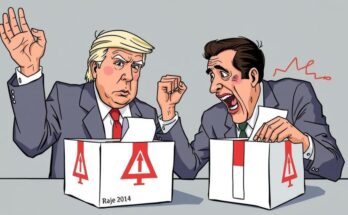Evo Morales, former president of Bolivia, claimed an assassination attempt following an attack on his vehicle amidst rising political tensions in the ruling socialist party. He described the event as planned, asserting shots were fired at his car. The incident correlates with escalating unrest among Morales’ supporters, as the government investigates the situation, while Morales faces economic and political challenges ahead of the 2025 elections.
Evo Morales, former president of Bolivia, has reported an assassination attempt following an attack on his vehicle that occurred on Sunday. Amid escalating political strife within Bolivia’s ruling socialist party factions as they prepare for the 2025 elections, Morales asserts that shots were fired at his car, narrowly missing him. During a radio interview, he recounted how two vehicles stopped him on the road and opened fire, stating, “I don’t know if they were soldiers or police.” Morales characterized the incident as premeditated, emphasizing, “The idea was to kill Evo.” Morales, who served as Bolivia’s first Indigenous president from 2006 to 2019, shared footage on social media showing bullet holes in the windshield of his car, with the footage indicating that the driver had sustained injuries but was still managing to operate the vehicle. The Bolivian government, represented by Deputy Security Minister Roberto Rios, has vowed to investigate the incident thoroughly, acknowledging their responsibility to assess the veracity of such claims, regardless of their truth. This alarming event occurs amidst increasing tensions in Bolivia, where Morales’ supporters have engaged in extensive road blockades, further intensifying the conflict. The government has lambasted Morales for his actions which they claim have destabilized the country, leading to interruptions in food and fuel supplies nationwide and warnings of armed groups allied with him. Concurrently, Morales is contending with a complicated political landscape, grappling with allegations of inappropriate relationships with minors while also facing criticism for his role in ongoing social unrest. Despite these allegations, he maintains that they are unfounded and part of a sustained attack against him by the ruling government. The political turmoil in Bolivia is escalating as the nation copes with economic challenges, including dwindling gas production and deteriorating foreign currency reserves, contributing to heightened infighting among factions within the Movement Toward Socialism party to which both Morales and the current President Luis Arce belong. The implications of this incident remind observers of the fragile state of democracy and the intricate nature of political alliances in Bolivia, setting the stage for further unrest as the 2025 elections approach.
In recent months, Bolivia has witnessed increasing political instability among factions within the ruling Movement Toward Socialism (MAS) party, particularly between former President Evo Morales and current President Luis Arce. Morales, who served as president from 2006 until his resignation in 2019, has been a pivotal figure in Bolivia’s post-colonial political landscape as the first Indigenous leader. The current political climate is fraught with tension, as the country navigates significant economic difficulties, including inflation and gas production declines, while Morales and Arce engage in a power struggle over the future direction of the party. This incident marks a notable escalation in hostilities that could have profound implications for both Morales’ political career and Bolivia’s sociopolitical landscape moving forward.
The reported assassination attempt on Evo Morales exemplifies the heightened political tensions in Bolivia as the nation braces for upcoming elections. Amid allegations of governmental persecution and a backdrop of economic turmoil, Morales continues to position himself as a significant player in Bolivian politics, despite facing serious accusations. The government’s commitment to investigating the attack indicates the potential for future confrontations between opposing factions as both the MAS party and Morales navigate the complexities of Bolivian democracy.
Original Source: www.aljazeera.com




